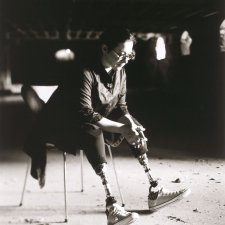Gill Hicks AM MBE (b. 1968) is a peace advocate, author, musician and artist. Having grown up in Adelaide, she moved to London in 1991 and worked as publishing director for architectural magazine Blueprint and as a senior curator with the Design Council. On 7 July 2005 Hicks set out for work as usual; within hours, she was the last living casualty rescued from one of three Underground trains attacked by terrorists in the '7/7' London bombings. Her injuries were so severe that rescuers could not tell if she was a man or a woman; she'd lost some 80 per cent of her blood, and was not expected to live. She was admitted to St Thomas’' Hospital tagged 'One Unknown'. Both her legs were amputated below the knee. As soon as she was able to walk, Hicks visited Beeston, where three of the bombers had come from, and met members of their community, who embraced her. Her first book, One Unknown, was published in 2007. Two and a half years after the bombing, she walked more than 430 kilometres from Leeds to London, inviting people from different communities to walk with her and communicate with one another. In 2008, she carried the Olympic torch in Canberra. Hicks returned to Adelaide in 2012 after 25 years in London, where she launched a studio and online business, M.A.D Minds, that explores the power of communication through music, art and the spoken word. She was the recipient of the Ed Tweddell Studio Residency at Central Studios, Adelaide and is a board member of the SALA (South Australian Living Artists) Festival and the Women's Playhouse Trust in the UK. Hicks has two honorary doctorates and was cited in the 2016 Australia Day honours list for 'significant service to the promotion of peace in the community through public engagement, education and network building initiatives'. She returned to London to feature prominently in ceremonies marking the tenth anniversary of the bombings.







